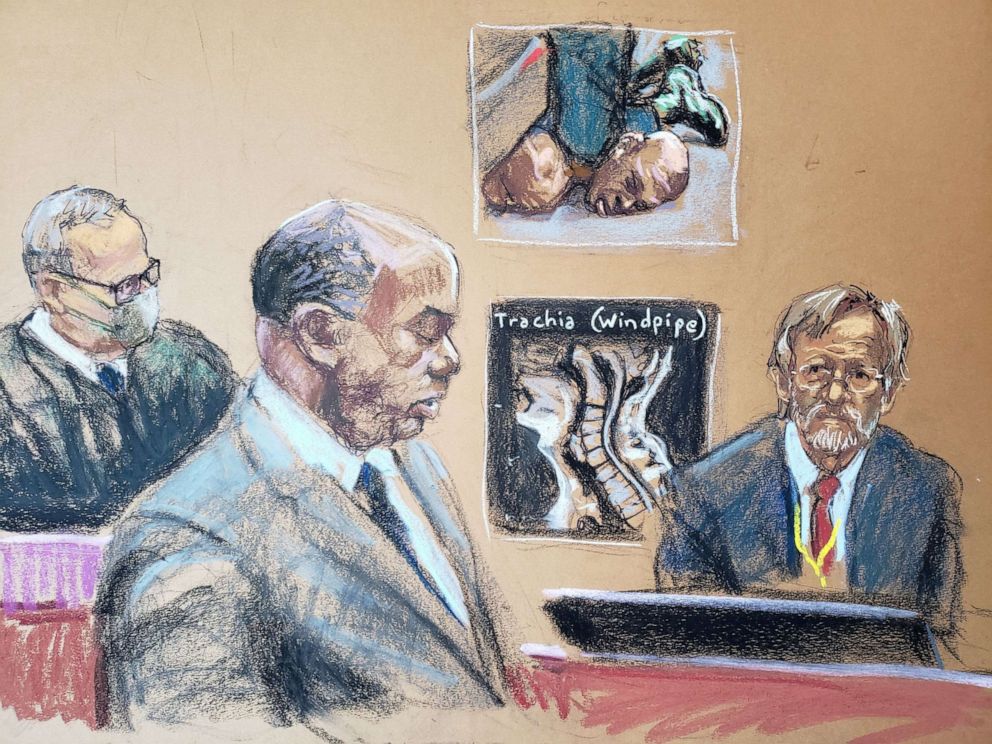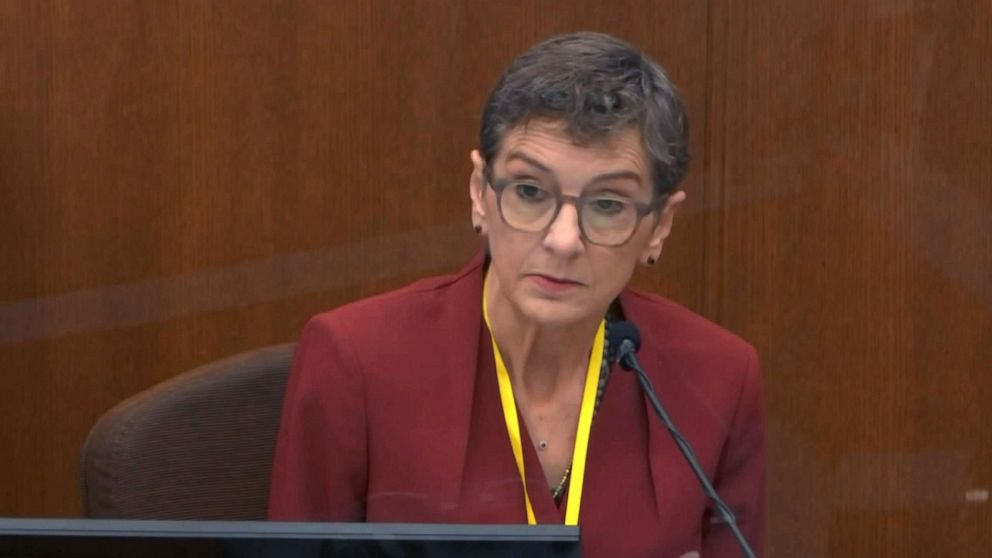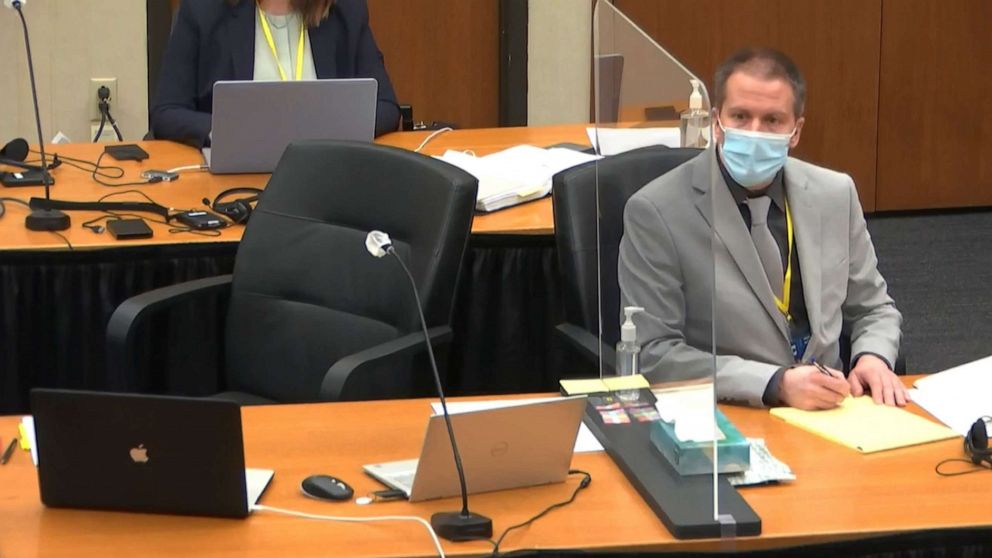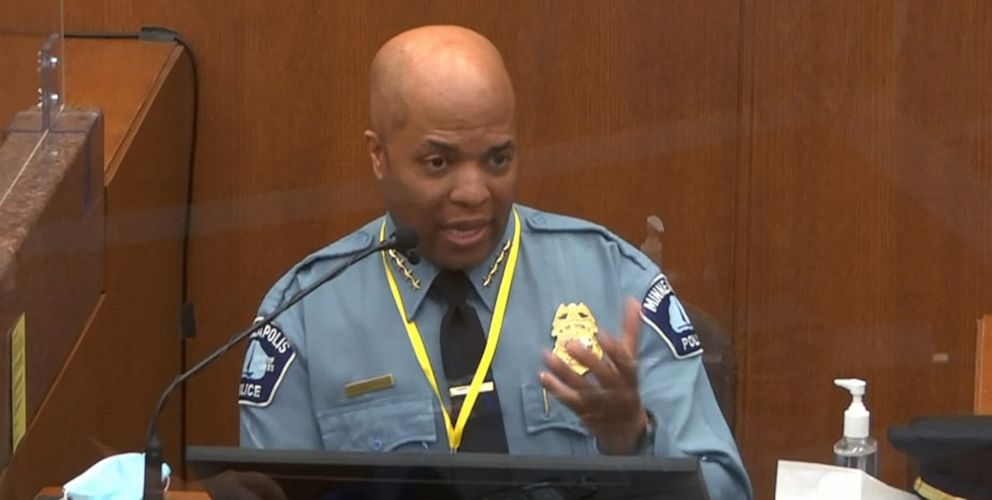Key takeaways from 2nd week of Derek Chauvin trial in the death of George Floyd
Chauvin is charged with manslaughter, second-degree murder, third-degree murder.
The second week of Derek Chauvin's high-profile trial wrapped up on Friday with testimony from the medical examiner who completed George Floyd's autopsy.
Officials said the former Minneapolis officer violated police policies in how he arrested and detained the 46-year-old Floyd in Minneapolis on May 25.
Medical experts also testified that Floyd died of asphyxia, contrary to the official medical examiner report.
Chauvin has been charged with manslaughter, second-degree murder and third-degree murder.
Here are the key takeaways from the trial's second week:
Experts counter medical examiner's report
Dr. Andrew Baker, the Hennepin County Medical Examiner who conducted Floyd's autopsy, took the stand on Friday.
Baker said he didn't look at video of Floyd's arrest until after completing the report, which concluded that Floyd died of "cardiopulmonary arrest, complicating law enforcement subdual, restraint, and neck compression," meaning that his heart and lungs stopped working. His death was ruled a homicide.
However, a slew of medical witnesses testified that Floyd died by asphyxia, which wasn't mentioned in the autopsy. The Floyd family commissioned an independent autopsy that also listed the cause of death as "asphyxiation from sustained pressure."
Baker said given that Floyd had hypertensive heart disease, meaning his heart weighed more than it should, "the law enforcement subdual and neck compression was just more than Mr. Floyd could take by virtue of his heart conditions."
Defense attorney Eric Nelson got Baker to acknowledge that he did feel that Floyd's heart disease and drug use played a role in Floyd's death, but Baker wouldn't budge that he believes the main cause of death is law enforcement restraint.

When asked about the contributing factors for Floyd -- his heart conditions and drug use -- Baker said, "They're not direct causes of Mr. Floyd's death."
Baker also told prosecutors that no pill or pill fragments were found in Floyd's stomach during his autopsy.
Prosecutors made the distinction that Baker ruled his death a homicide, not an accidental or natural death as a result of drug use or heart conditions.
The defense questioned Baker on the lack of bruises and on Floyd's neck and back, apparently trying to argue that Floyd possibly didn't die from asphyxia.
"That's just not something that I think we see as medical examiners -- pressure to the back of the neck explaining strangulation," Baker said. "My opinion remains unchanged. It's what I put on the death certificate last June. It's cardiopulmonary arrest, complicating law enforcement subdual, restraint and neck compression. It would stay my top line now."
One of the most damning testimonies came from world-renowned pulmonologist Dr. Martin Tobin, a Chicago doctor and breathing expert.
On Thursday, he led jurors through a series of demonstrations illustrating the pressure placed on Floyd's neck during the arrest, concluding he died from "a low level of oxygen" that damaged his brain and stopped his heart.
He dissected video footage of the incident from different angles and said Floyd essentially was squeezed to death, with Chauvin's knee jammed into Floyd's neck, narrowing the hypopharynx in his throat and severely restricting his ability to take in air.

Tobin also rejected the possibility that Floyd died from a heart attack or drugs.
In a dramatic moment, Tobin noted that even after Floyd had no pulse, Chauvin kept pressure on Floyd's neck for several another two minutes and 44 seconds.

Dr. Lindsey Thomas, a forensic pathologist in Minneapolis, supported Tobin's statements that Floyd died of asphyxia during her testimony on Friday.
She also said that she trained Baker.
Thomas ruled out that the possibility of a drug overdose death, saying, "This was not a sudden death," later adding that "there is no evidence to suggest [George Floyd] would have died that night except for the interactions with law enforcement."
Discussion over potential drug use
Special Agent James Reyerson of the Minnesota Bureau of Criminal Apprehension, the lead investigator in the case, was showed video of the arrest and he testified that at one point it sounded as if Floyd was telling the officers, "I ate too many drugs." But after re-watching the video, Reyerson changed his answer to what he though Floyd said. "I believe Mr. Floyd was saying, 'I ain't do no drugs.'"

A forensic scientist for the Bureau of Criminal Apprehension, Breahna Giles, said some of the pills in Floyd's SUV contained methamphetamine and fentanyl.
Susan Neith, a forensic chemic at NMS labs in Pennsylvania, said the pills she tested contained a methamphetamine concentration of 1.9% to 2.9%, which she described as significantly lower than "street" meth. "The majority of the time I see 90 to 100% methamphetamine," she added.
Police officials said Chauvin violated policies
MPD Chief Medaria Arradondo testified Monday that Chauvin's restraint on Floyd violated the department's conscious neck restraint by exerting more than "light to moderate pressure." He also said Chauvin failed to render aid to Floyd even when he didn't have a pulse.
The chief terminated Chauvin, a 19-year police veteran, the day after his encounter with Floyd.
"To continue to apply that level of force to a person proned out, handcuffed behind his back, that in no way shape or form is anything that is by policy," Arradondo added.
Sgt. Jody Stiger, a 28-year veteran of the Los Angeles Police Department, said the force used on Floyd was not warranted for a low-level offense, in this case Floyd allegedly using a fake $20 bill to buy cigarettes.
Minneapolis Police Officer Nicole MacKenzie, the department's medical support coordinator, testified on Tuesday that Chauvin completed in-service training in CPR and first aid multiple times. Yet on May 25, he and other officers failed to apply that training.
ABC News' Bill Hutchinson and Whitney Lloyd contributed to this report.